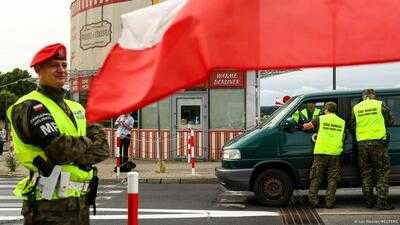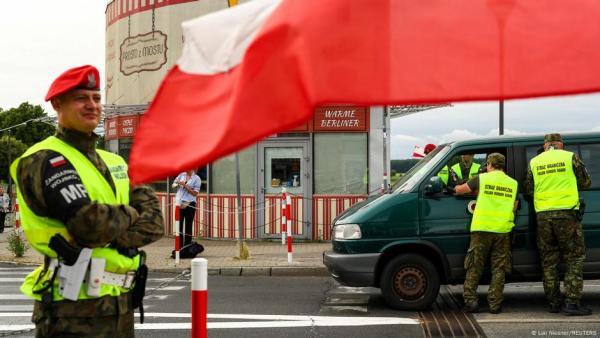

For years, people living near the German-Polish frontier took the open border for granted in their daily lives. With the re-introduction of border checks, all that is changing.The bridge that connects the German city of Frankfurt an der Oder and the Polish city of Slubice is quite a strange sight these days. Rows of EU flags have been hoisted on it and on either side of it. Those crossing from the German side see a sign that reads "Frankfurt Oder - Slubice" and the words "Ohne Grenzen. Bez Granic" — "without borders" in German and Polish. But the slogan, which both cities have been using in their joint marketing campaign for years now, no longer applies the way it used to. Germany began carrying out spot checks at the border in October 2023, and Poland followed suit on Monday, July 7. Response to Germany's migration policy Poland has reinstated controls at 52 border crossings with Germany and 13 with Lithuania. The checks on the Polish side, which were introduced by Polish Prime Minister Donald Tusk, are a response to the fact that Germany has toughened its migration policy. On the instructions of German Interior Minister Alexander Dobrindt, the Federal Police have since May been allowed to refuse entry to asylum seekers attempting to cross the German border — an approach that is legally controversial and has become a hot button issue in Poland. Impact on daily lives Just how strong emotions on the subject of migration are is evident here in the border region. "It's all just a political show, manipulation. We don't feel threatened by migrants who are allegedly being sent back from Germany," says Arkadiusz from Poland, who is on holidays in the region with his wife and drove to the border to see what the situation there is. "It's just going to get more difficult for people living in the border region," adds his wife, Dorota. This is a concern shared by 17-year-old student Lilith from Frankfurt an der Oder. She's on her way back from visiting a friend on the Polish side. On the one hand, she doesn't think the border checks are bad. She herself has not been stopped very often since Germany reintroduced checks. On the other, her fellow Polish students are having a really hard time: "Because there are more tailbacks as a result of the border checks, they often arrive much too late at school," she tells DW. She's afraid that things are going to get even worse now that Poland is carrying out checks, too. 'Citizen patrols' at the border But the German-Polish border is not only being guarded by national border guards. In Slubice and elsewhere along the border, self-proclaimed "citizen patrols" have been popping up at border crossings since the end of June. Although the number of Border Defense Movement members "guarding" the border in Slubice is not as high as it is elsewhere, a few do appear here every day, wearing neon hi-vis vests. On Monday morning, no one from the citizen patrols was on the bridge. But their banners — emblazoned with the words "No Immigration" and "Stop imigracji" — are attached to the bridge's metal railings. Toward midday, two men arrive. They are later joined by three more. They stand together, using their smartphones to film the border guards as they conduct checks. Neither the police officers nor the Polish border guards pay them any attention. The members of these so-called "citizen patrols" are curt and wary about anything they perceive as German. One man, who comes from Slubice, gives German answers to any questions put to him in Polish. "You're from the German media!" he says reproachfully. He doesn't want to make any statements on the record. Conspiracy theories Tomasz, who also comes from Slubice and is wearing a baseball cap with the words "Trump 2024. Take America back," has more to say. Although he himself does not take part in the patrols, he thinks they are good: "The only reason these checks are being carried out is because of the Border Defense Movement, which forced the Polish government to carry them out," he tells DW. But he feels that it would make more sense to patrol the forests in the border region: Even though there is no proof, Tomasz is convinced that the German police are secretly sending migrants back to Poland through the forests. Another blow to Schengen In the course of the day, people who want both countries to stop conducting checks appear at the border, too. Three men from the Frankfurt Remains Colorful network hold up signs. One of them includes a German translation of the words of the late Pope Francis: "The future is not built in isolation." One of the group, German citizen Jan Augustyniak, is afraid that the freedom of travel between Poland and Germany, which has been in place since Poland joined the Schengen area in December 2007, is being increasingly restricted. "When Germany introduced controls in October 2023, they were only supposed to last three months," he says. "Now, it's July 2025 and we have checks on both sides of the border." A native of Frankfurt an der Oder, he believes that as more and more countries go it alone and apply for exceptions to Schengen rules, the Schengen Agreement will at some point become worthless. A model region for EU integration Frankfurt an der Oder and Slubice have long been seen as a model of European integration. It's impossible to determine how closely the two cities have become intertwined and the number of joint projects carried out by them over the last 30 years. There is a joint district heating system for both cities, children and young people learn Polish and German right throughout school, thousands of Poles commute to the German side for work and Germans go shopping or to the dentist on the Polish side. And then there are all the tiny aspects of daily life in a border region: nipping across the border for cigarettes or gasoline, going out for a meal or visiting friends. All of this has been par for the course for years. "The checks that have been in place on the German side for some time now have a negative impact on us. When it comes to personal relations, the economy and traffic, they make our life difficult," Slubice Mayor Marzena Slodownik tells DW. She is critical of the fact that none of the people making decisions in Berlin and Warsaw know how people live here in the border region. "The provisions being imposed from above have an enormous influence on our lives. This will inevitably have an impact on mutual relations," says Slodownik. She would like to see a different way of dealing with migration that takes into account the way people in the border region lead their lives. People turned away at the border The Polish border controls pass off without incident on Monday, although there are tailbacks from time to time. The Polish border guards check the bus that shuttles back and forth between the two cities and conduct spot checks on larger vans and cars with tinted windows. Some pedestrians are asked to show their papers, too. It often appears as if people's appearance determines who is allowed to pass and who is given a more thorough check. People perceived as migrants seem to be stopped most. Over the course of several hours, the Polish border guards find no one who is not allowed to enter Poland. Eventually, two Chechen women are turned back. They later explained to DW that they wanted to go shopping in Slubice — something they often do. The women showed the guards their papers (residence permits for Germany). To cross the Polish border, however, they have to show their passports, which they have left at home. "I just wanted to buy tomatoes," says one of the women, shrugging her shoulders and going back across the bridge to Frankfurt. This article was originally published in German.